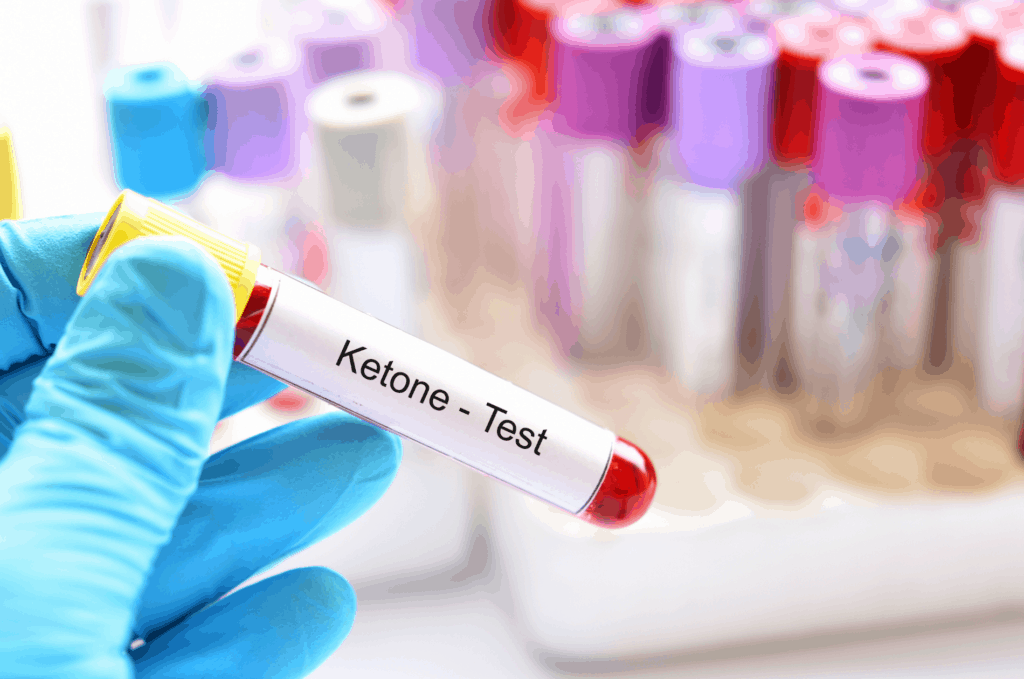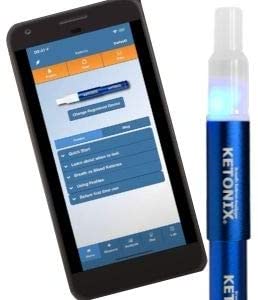
Ketosis is a state where your body produces ketones. Ketones are produced by the liver when it breaks down fatty acids and converts them into energy, which can be used instead of glucose as an energy source. Typically it’s something that ketogenic diet followers strive for.
The simplest way to know if you’re in ketosis is to test for ketone levels. There are three ways that you can go about testing for these levels: urine, breath, and blood samples. We’ll cover each one in detail below!
Why Test Your Ketones
Monitoring your ketones gives you insight into how your body is responding. It’s a great way to measure the success of your diet and whether or not you’re in ketosis.
*You can test for urine, breath (with an acetone meter), OR blood sample
Three Types of Ketone bodies
Acetoacetate (AcAc): It is interesting to know that the fats we eat are broken down by our liver into ketone bodies. When glucose becomes unavailable, fat cells will break it down for energy instead and this process creates acetoacetate which can be detected in urine as soon as you enter a state of ketosis. This is what your testing when your using urine ketosis strips.
Acetate (Acetone):Acetoacetate, the simplest beta-keto acid, is converted into either Beta-hydroxybutyrate (BHB) or acetone. Acetone is a byproduct of fasting and dieting that can be exhaled through your lungs as waste rather than used for fuel. It’s sometimes called “exhaust ketones.”This is what your testing when you use a breath ketone test.
Beta-hydroxybutyrate (BHB):
BHB or Beta-hydroxybutyrate (β- hydroxybutyric acid) has been touted as a miracle ketone for its ability to regulate
insulin sensitivity, improve glucose tolerance in type 2 diabetes patients. This is what your testing when you measure ketosis in your blood levels. It can fuel most of the brain’s energy needs along with organs and muscles and represents approximately 70% of the available ketone energy. This is what you test for with blood ketone meters.
Now that you know about the three types of ketones, let’s review how they are tested and what type of results to look for. Different testing methods will give different levels of accuracy depending on which 3-types (acetoacetate, beta-hydroxybutyrate, or acetone) are present in your urine sample at the time it was taken.
Nowadays everyone has become so health-conscious – especially when we hear words like “ketosis” coming up again and again! Let’s measure it!
Urine tests :
How to Test Ketone Levels Using Ketosis Strips
When you’re in ketosis, your body produces and excretes higher levels of the chemical compound called “ketones.” And with Keto Test Strips, thanks to a quick dip into some urine (or just looking at it) that can be measured as well!
Basically all one has to do is pee on little strips of paper or look for simple color changes – which are typically either light yellow/orange if there’s enough ketone concentration or dark brown-black when there isn’t any – they will give an idea about whether someone is experiencing low levels or high levels of Ketones but not provide exact measurements because results aren’t always accurate.
Keto urine strips are less accurate the longer you’ve been on a ketogenic diet. If you have been doing it for long-term, your body will become more efficient at using its stored fat to make energy and burn fewer of these ketones in order to maintain homeostasis. As this happens, your levels may not be accurately reflected by any given Keto testing strip because they measured how much is excreted in our urine rather than being produced inside one’s own body as fuel.
Advantages of Urine Ketone Testing Strips
- Ease of use. You just have to point your urine stream to a strip of paper .. Urine ketone testing is the easy way!
- Costs: Ketone strips are very inexpensive. You can get 50 test strips for under 10 bucks on amazon.
Disadvantages of ketone urine test strips
- Not as accurate as either blood or breath testing as it measures excess ketone not ketones in the body
Breath ketone tests
How to Measure Ketosis With Breath Testing
Breath testing is one of the newest ways to measure your ketone levels. When you’re in ketosis, acetones are released through your breath as breath acetone and can be measured using a device called Ketonix meter. You plug it into a USB port or use its battery pack then blow air until it starts flashing (indicating that it’s measuring). A reading will typically range from 0-14, with higher numbers indicating deeper states of ketosis.
The ketone breath meter is a one-time investment and, unlike other monitoring methods of the same kind, you can measure your levels as often as desired without any extra cost.
is a one-time investment and, unlike other monitoring methods of the same kind, you can measure your levels as often as desired without any extra cost.
Breath testing is less accurate than blood, but it can be the best option if you don’t want to deal with bodily fluids or keep buying testing strips. One additional note: drinking alcohol on a keto diet will make your breath levels inaccurate for as long as that alcohol stays in your system. You can pick one up here on Amazon.![]() I like the Ketonix they seem to be the most accurate with a nice app that you can use with it to track your ketosis.
I like the Ketonix they seem to be the most accurate with a nice app that you can use with it to track your ketosis.
Advantages of Ketone Breath Testing
- No buying of strips etc. for testing
- Unlimited easy testing whenever you like and no supplies to buy.
Disadvantages of Ketone Breath Testing
- Drinking alcohol can have a negative effect on the results
- A good unit is expensive
- Less accurate than blood testing
Blood Tests:
Blood Ketone Meter:
The gold standard in ketone measurement, a blood meter is the most accurate way to detect ketones in your body.
The blood-ketone test is a simple way to measure how much of the ketones are in your bloodstream. The test can be done at home with just some supplies and gives accurate, fast results without any hassle whatsoever.
The blood meter provides a reading of beta-hydroxybutyrate, the most active form of ketones in your body.
The number that registers on your meter is representative of how much you have at any given time and is usually indicative of what stage you’re currently experiencing when it comes to ketosis. It’s very accurate and will tell you what level of actual ketosis that you are in.
The most reliable way to measure ketone levels in your bloodstream is by using a blood meter, which detects the level of ketones with only one drop of blood. It is similar to the way diabetics measure blood glucose levels with a drop of blood
Some glucose meters also include blood ketone testing to make sure diabetics don’t enter diabetic ketoacidosis which is a dangerous state if your diabetic.(dieter enter what is called nutritional ketosis)
The best time for testing your BHB (beta hydroxybutyrate) levels are after you have fasted overnight and before breakfast on an empty stomach.
Advantages of using a ketone blood meter
- Very accurately measure your level of ketosis
- Using your iPhone to interface with the meter to figure out your exact blood ketone levels
Disadvantages of using a ketone blood meter
- You have to draw blood on your finger tips
- You have to buy test strips
- Not cheap
Conclusion
The ketone test can accurately diagnose the effectiveness of nutrition, exercise, or wellness plan by determining blood ketones.
Urine and breath tests may show that you are in ketosis but they don’t give an accurate depiction of your blood levels and will lead to false conclusions about whether or not you have achieved this state as well as how different variables affect it while on a diet.
So when you are starting out stick with the urine strips then when you feel the keto journey is something that will work for you switch to blood measuring for a snapshot of where you are in ketosis. In our opinion the blood ketone analyzer keto mojo give you the best and most accurate results for testing your ketone levels.
Recent Posts
MCT Oil Usage | Benefits | Side Effects | Keto Coffee Recipe It's all in the name, medium-chain triglyceride (MCT) oil contains medium-length chains of fats called triglycerides. The short and fat...




